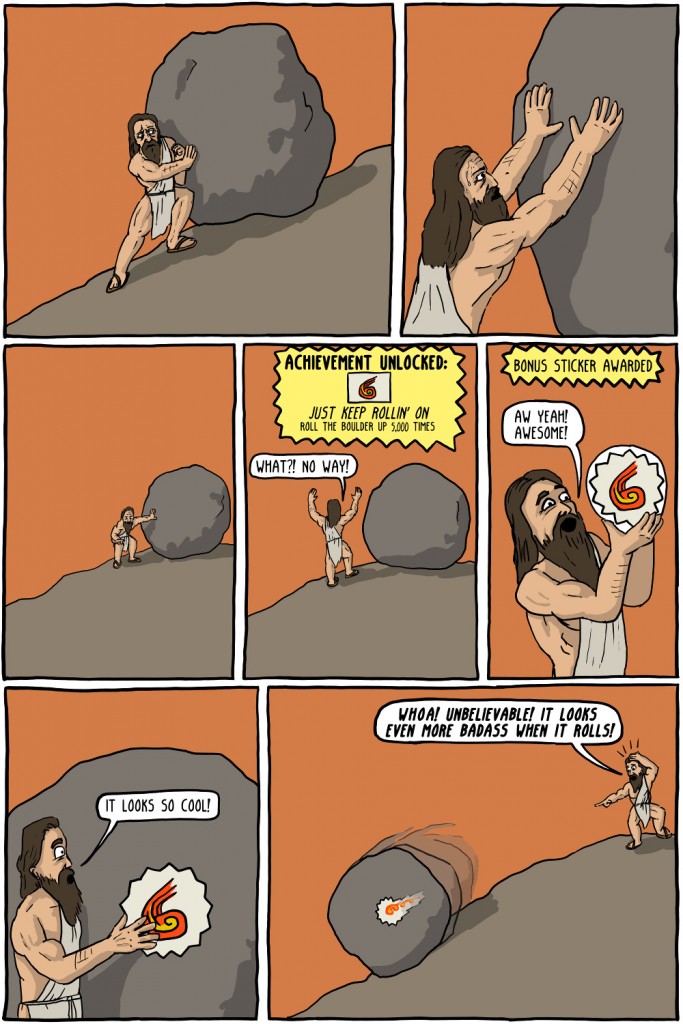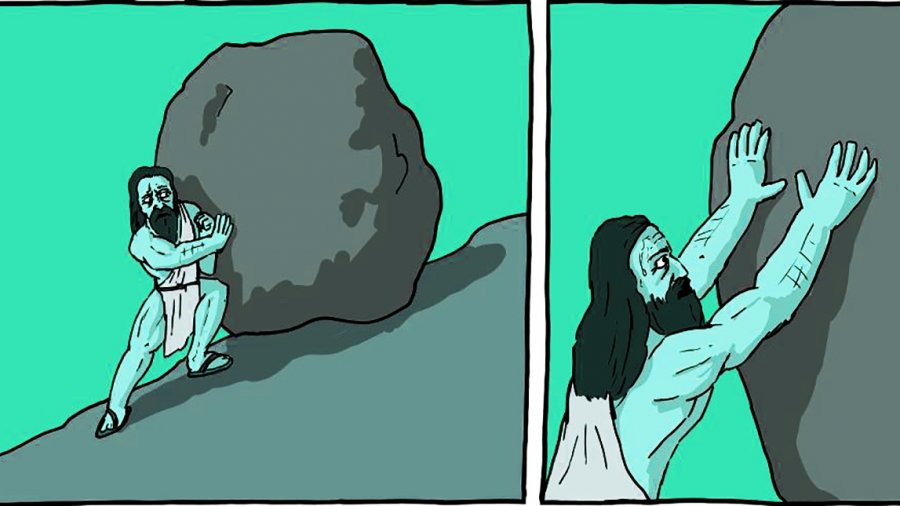Today I’m going to share yet another splendidly insightful comic from Existential Comics with some commentary on the ideas presented in the comic.
As I said in my last post:
“Sharing and elaborating on Existential Comics’ striking, moving, thought-provoking, and/or hilarious philosophy comics seems like a great way to make philosophy education more fun and accessible, and to help popularize philosophy.
So I’ll probably keep doing this.
After all, various forms of philosophy underlie all of our modern societies and individual belief systems. Studying philosophy can profoundly transform your life by altering the way you understand and relate to the world around you.”
Without further ado, here’s the comic.
‘We Must Imagine Sisyphus Happy’ by Existential Comics

Didn’t Get the Joke?
There are a couple of layers to understand here. First of all, one needs to know about the original myth of Sisyphus from Greek mythology. From Wikipedia:
In Greek mythology Sisyphus was a king of Ephyra (now known as Corinth). He was punished for chronic deceitfulness by being compelled to roll an immense boulder up a hill, only to watch it roll back down, repeating this action forever.
 So Sisyphus is the unlucky dude in Greek mythology who has to roll a boulder up and down a hill forever. In 1942, the French existentialist philosopher Albert Camus (who did not actually consider himself an existentialist but is generally categorized as one) wrote an essay called “The Myth of Sisyphus.”
So Sisyphus is the unlucky dude in Greek mythology who has to roll a boulder up and down a hill forever. In 1942, the French existentialist philosopher Albert Camus (who did not actually consider himself an existentialist but is generally categorized as one) wrote an essay called “The Myth of Sisyphus.”
In the essay, Camus elaborates his famous philosophy of the absurd. Again, from Wikipedia:
“In the essay, Camus introduces his philosophy of the absurd: man’s futile search for meaning, unity, and clarity in the face of an unintelligible world devoid of God and eternal truths or values. Does the realization of the absurd require suicide? Camus answers: “No. It requires revolt.” He then outlines several approaches to the absurd life. The final chapter compares the absurdity of man’s life with the situation of Sisyphus, a figure of Greek mythology who was condemned to repeat forever the same meaningless task of pushing a boulder up a mountain, only to see it roll down again. The essay concludes, ‘The struggle itself […] is enough to fill a man’s heart. One must imagine Sisyphus happy.'”
So Camus argues that man is faced with an absurd predicament: being a meaning-making creature in an meaningless universe. He compares the human experience and specifically the experiences of the people of his time—spending their lives working futile jobs in factories and offices—with the absurd life of Sisyphus, the tragic hero. Ultimately, he argues that if Sisyphus acknowledges the futility of his task and the certainty of his fate, that he can then be free to recognize the absurdity of his situation and reach a state of contented acceptance.
This, Camus argues, is what we must likewise do in order to reach a state of contentment or happiness. That is, we must recognize the absurdity of our predicament as meaning-making creatures in a meaningless universe in order to reach a place of acceptance of this condition and to be okay with living out the day-to-day details of our existences. Camus concludes the essay by suggesting that “one must imagine Sisyphus happy,” indicating that meditating upon a happy Sisyphus can be instructive in realizing how to be content with one’s own life.
The Existential Comics Twist
This particular comic from the ever-marvelous Existential Comics is playing with this idea of a happy Sisyphus by imagining that rolling the boulder up and down the hill is a kind of video-game-esque scenario in which Sisyphus can unlock achievements and be awarded stickers and accolades for his endless devotion.
I find this to be a brilliant spin because it can be seen as simultaneously poking fun at human psychology and alluding to a major mechanism of control in modern societies.
Recognition-Chasers
On one hand, who could argue that it isn’t true that people are often seemingly happy and motivated to chase awards and accolades for arguably meaningless tasks? Just look at the hundreds of millions of people who do spend countless hours playing video games in pursuit of new ranks, achievements, and badges—digital awards worth nothing in “real life.”
I’m not even hating on video games (I like video games). I’m just saying that when seen through this lens of Sisyphus being happy to push the boulder as long as someone’s tossing him a (worthless) trophy every hundred times he reaches the top, our own pursuit of trivial accolades starts to seem kind of foolish, in an unsettling way.
And this phenomenon of empty-accolade-pursuit extends far beyond video games. Just look at people who clearly try very hard to get 100+ ‘likes’ on their latest, uber-happy-seeming profile pic, or people who seek prestige and recognition while working for an unethical corporation, or people whose sole, underlying goal is just to accumulate as much money as possible to show everyone else how awesome and successful they are. To some extent, most all of us are enticed by the idea of being recognized for our efforts, even if our efforts are ultimately meaningless. And Existential Comics is poking fun at that tendency.
A Minor Tangent About How Weird the Modern World Is
I don’t want to be misconstrued as suggesting that our desire for recognition is inherently “bad,” but it can be a trap, especially in the 21st century.
From one point of view, craving recognition is just part of our psychology. Our brains release serotonin when we’re publicly recognized in a positive way. On some level, we all need to feel recognized and appreciated, and I don’t think it’s wrong to feel gratified when we’re honored in some way for our work or accomplishments. But we should note that for most of human history, being recognized and appreciated publicly was not possible without a genuine, loving community that one was benefiting in some way. This genuine community constituted the foundation for long-term well-being and was the context in which the release of yay-I’m-getting-recognized chemicals was meaningful.
A problem that I’ll leave you to think more about is that nowadays society and technology are sufficiently complex that our brains are often tricked into releasing serotonin, even when there’s no genuine, supporting community around us to render those happy-feels meaningful. If I get an award at work, I might feel fleetingly proud of myself, but if I suspect that all of my co-workers secretly covet the award and don’t give a shit about me, those prideful feelings will fade quickly and may ultimately feel hollow. Similarly, if I top the world leaderboards in a video game while playing with a group of online peers who I’ve never met in real life and who may not care about me at all, the victory may feel vaguely empty. And, if I get 50 ‘likes’ on a profile pic but can’t seem to actually get any of those ‘likers’ to spend time with me in the real world, I might feel a brief high but also a palpable lack, a sense of artificial love.
I think that when we have these hollow victories, we’re often left feeling that the solution to our vague emptiness is to pursue more of the same kind of victory. More awards at work, a higher rank on Call of Duty, more ‘likes’ on our profiles. However, these pursuits will never fulfill us if they aren’t accompanied by sincere community, support, and love; and the danger is that most of us don’t recognize what is truly missing from the equation. And that’s not to say that genuine community and love cannot arise at work, in video game communities, and on social media—I think they can, though I suspect that it’s the exception and not the rule. I also think that in the latter examples—video games and social media—an essential physicality will always be lacking. There’s just something about getting a big, IRL hug from someone who loves you that can never be replaced by pixels on a screen or a disembodied voice on a headset.
So, to sum up this tangent, the modern world is tricky in that many things can give us brief highs in the form of awards and recognition without providing us the real community and love that would make such highs meaningful. I humbly submit that we ought to be cautious not to sacrifice deep, authentic relationship and community in favor of pursuing these fleeting highs. Because without community, the highs of recognition fail to contribute to long-term well-being and can end up transforming our lives into a hollow search for the next meaningless blast of serotonin.
Shiny Carrots
The other thing I mentioned that I like about the comic is that it suggests something about how to control people. The comic suggests that if you just dangle a sufficiently shiny carrot before someone’s eyes, they’ll be happy to do whatever you want. If you show someone how good a few ‘likes’ on Facebook feel, they’ll get on Facebook all the time and take hundreds of selfies to try to get the perfect profile pic for a 100-‘likes’ serotonin-explosion. And if you present people with a prefabricated dream of a life of HDTVs, luxury automobiles, excessive cash, mansions, and beautiful people all around, they’ll be prepared to perform the most meaningless of labor in order to attain that vision. These dangling-carrot tricks arguably play a significant role in how modern societies compel millions of people to work long hours at dull, menial jobs to fuel the ever-growing global economy.
This is the point at which a lot of people thinking about these things might start shouting about how people need to liberate themselves from this system, think for themselves, determine their own values, etc. And I do think it might be a good idea to do that (especially since mindlessly upholding the status quo is, like, leading toward global catastrophes and stuff). But what if people are content to play that game? What if they’re happy, like the Sisyphus in the comic? What then? Should they want to snap out of it? And how can you ever be certain you’ve broken out of the hollow chase and aren’t just pursuing a different kind recognition, a more subtle accolade?
I’ve thought long and hard about these things and determined that I’d like to live a life based wholly or mostly on intrinsic motivation—to do things because I love them or see innate value in them or because compassion compels me; to not let the promise of external rewards dictate my life. I’ve worked for years to live like this, but it’s damn difficult. I feel I’ve come a long way and will continue to work on getting down to the basic me-stuff, but there are simply so many hyper-tantalizing external rewards—Internet fame, Earthship mansions, etc.—for one to desire in the modern world.
So, ultimately, I’m not prepared to say I’ve fully succeeded in my quest to do things purely for love and intrinsic joy.
Are you?
—
If you appreciated this, check out more posts involving Existential Comics:
A version of this essay was first published at HighExistence.
About Jordan Bates
Jordan Bates is a Lover of God, healer, mentor of leaders, writer, and music maker. The best way to keep up with his work is to join nearly 7,000 people who read his Substack newsletter.





> I’ve thought long and hard about these things and determined that I’d like to live a life based wholly or mostly on intrinsic motivation—to do things because I love them or see innate value in them or because compassion compels me…
Yes, but have you considered how those “innate values” and “intrinsic motivation” were installed?
i have considered that, greg. i strongly suspect that humans are born with intrinsic curiosity that is largely suppressed by our rigid, disciplinarian schools and society in general. if one can recover this curiosity, one can simply follow what one finds most interesting/compelling (see this piece: http://www.refinethemind.com/schopenhauer-on-education/). you could argue, though, that what one finds interesting/compelling and what one values will always to some extent be shaped by one’s external environment and the external conditions of one’s experiences. this starts to get into some hazy philosophical territory. some one suggest that we have an innate essence/soul that we can get… Read more »
For a lot of actions I simply ask myself “Would you still do this, if you were the last human being on earth?”
works for me
brilliant heuristic, mathias. seriously, i like that a lot. reminds me of my “anonymity thought experiment” — basically i said we should meditate on how we would live if we knew absolutely no one. similar concept.
http://www.refinethemind.com/the-anonymity-litmus-test-how-would-you-live-if-no-one-knew-you/
Well — and sorry if this was addressed later on in the article I don’t have to much time to read it today but I read about half — one must realize that Sisyphus, according to what I know about him, Was a greedy and deceitful king. He would sometimes end up killing his travelers in his kingdom and this directly conflicted with Xenia (the ritual of Hospitality). Zeus, sometimes referred to as Zeus Xenios, was the main god protecting this role, sometimes called the protector of guests. (Which I get is ironic since he also is known for raping… Read more »